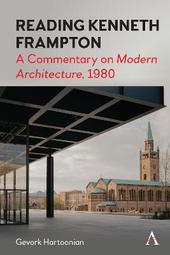
|
Reading Kenneth Frampton: A Commentary on 'Modern Architecture', 1980
Hardback
Main Details
| Title |
Reading Kenneth Frampton: A Commentary on 'Modern Architecture', 1980
|
| Authors and Contributors |
By (author) Gevork Hartoonian
|
| Physical Properties |
| Format:Hardback | | Pages:222 | | Dimensions(mm): Height 229,Width 153 |
|
| Category/Genre | History of architecture |
|---|
| ISBN/Barcode |
9781839983498
|
| Classifications | Dewey:724 |
|---|
| Audience | | Professional & Vocational | |
|---|
|
Publishing Details |
| Publisher |
Anthem Press
|
| Imprint |
Anthem Press
|
| Publication Date |
10 May 2022 |
| Publication Country |
United Kingdom
|
Description
This book focuses on the first edition of Kenneth Frampton's Modern Architecture: A Critical History, published in 1980. It searches for clues and positions that will provide the reader with an unprecedented insight into the significance of Frampton's historiography of modern architecture. It explores selected themes in line with Frampton's many-faceted contribution, certain aspects of which can be noted between the lines of his ongoing criticism of the present-day architecture, which inevitably lead us to a critical understanding of the past, the modernity of architecture's contemporaneity. The compiled chapters attempt to open a window onto the constellation of themes that allowed Frampton to hold on to his anteroom view of history even amidst the flow of time and flood of temporalities spanning 1980-2020. The book elucidates how Frampton's critical presentation of the history of modern movement architecture and the book's classificatory mode (periodization?) contribute to our understanding of the contemporaneity of architecture today.
Author Biography
Gevork Hartoonian is Professor Emeritus of Architecture, University of Canberra, Australia. He is the editor of The Visibility of Modernization in Architecture: A Debate, (Routledge, forthcoming) and the author of Time, History and Architecture (Routledge 2018), and Ontology of Construction (Cambridge University Press, 1994), among other volumes.
Reviews"The book is a critical unraveling of Frampton's ideas; his use of Walter Benjamin, Hanna Arendt and Martin Heidegger, which the author elegantly analyzes. It is well structured and written. The approach (starting with the importance of epigraphy), the selection of key themes (the cultural, technical and territorial), and the close readings, are convincing and strong. The book speaks to Frampton's ongoing critique of contemporary architecture culture. Hartoonian's book is a timely contribution to this ongoing debate." -Patricio del Real, Associate Professor of History of Art and Architecture, Harvard University, USA "Kenneth Frampton is unquestionably one of the most influential and original architectural thinkers of the last hundred years. Now in its fifth edition, his Modern Architecture: A Critical History remains a mainstay in architecture schools and design offices around the world. In this brilliant study, Gevork Hartoonian offers us a lucid and in-depth account of the authors who shaped Frampton's thinking, from Walter Benjamin to Hannah Arendt. He also gives us a compelling interpretation of Frampton's engagement with leading protagonists of the modern movement, from Le Corbusier to Louis Kahn, from Ludwig Mies van der Rohe to Alvar Aalto. This book is necessary reading for students of postwar architectural thought, as well as for those seeking a deeper understanding of the debates and ideas shaping architecture today." -Nader Vossoughian, Associate Professor, Architecture, New York Institute of Technology, USA Hartoonian's historical study of the first edition of Modern Architecture aims, per the introduction, "to establish Frampton's historiography and his ongoing endeavor to promote a critical understanding of the historicity of architectural crisis." Hartoonian does not do a chapter-by-chapter account of Modern Architecture, in other words. Reading Kenneth Frampton is dense historiography for other historians, not a book for architects, even those enamored with Frampton. - A Weekly Dose of Architecture Books The first two chapters focus on the big picture, in order to trace Frampton's historiographical approach through his selected cover images, timespans, and opening quotes to the main parts of his Critical History; the remaining five chapters then move along selected parts of this history, with the last chapter ushering in the formulation of critical regionalism. As a result, one feels that they are diving into Frampton's book hand in hand with Hartoonian, the well-versed scholar and experienced commentator - Stylianos Giamarelos; Fabrications; Routledge Taylor and Francis
|